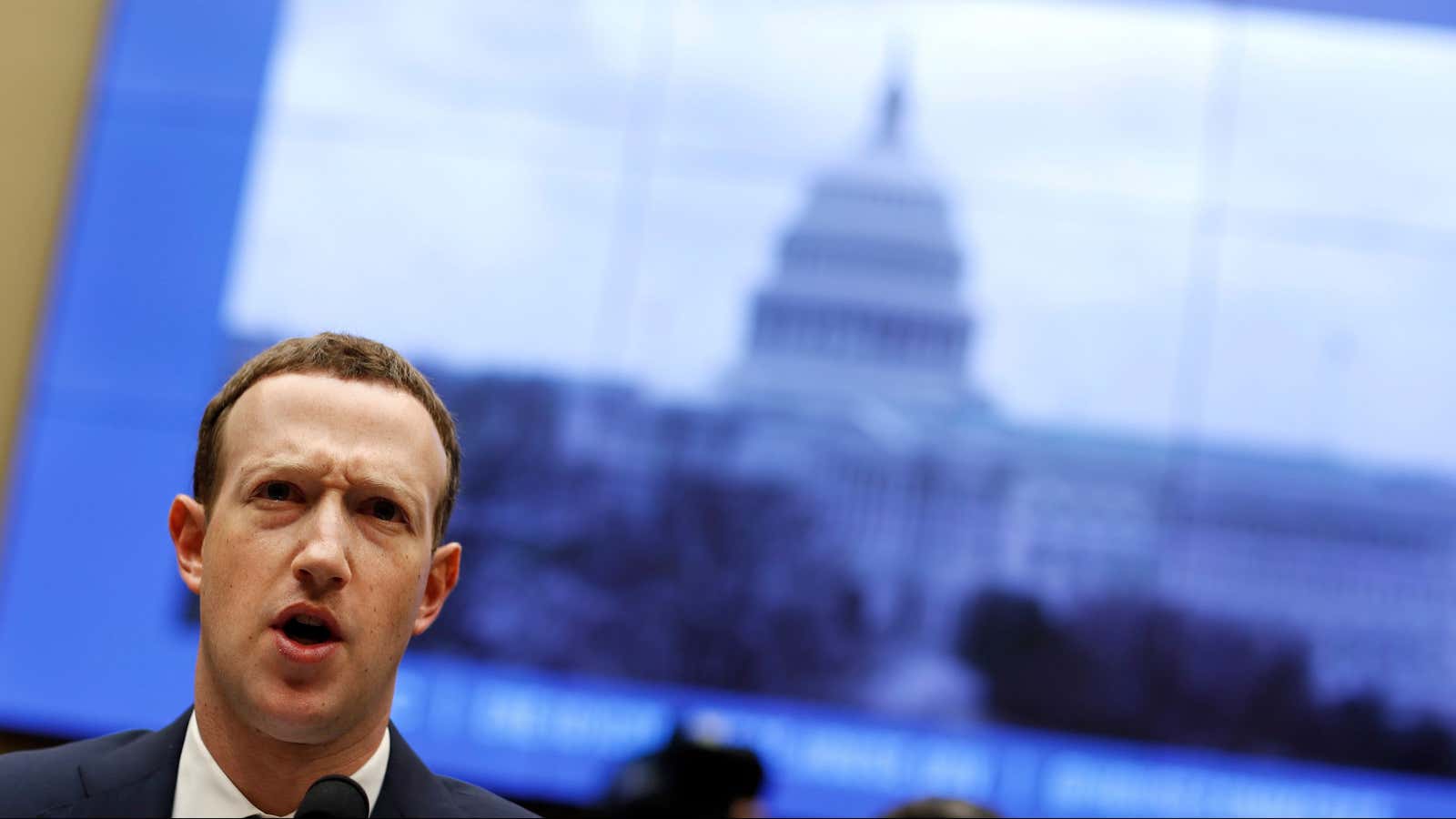Facebook is truly massive. Like, probably even more massive than you think. One-third of all living humans uses the site every month, even though it is banned in China, the world’s most populous country. And while the company has been mired in one scandal after another over the past couple years, it is only getting bigger.
Numbers are one way to understand Facebook’s scale. Another is to look at the types of problems it feels it needs to solve or deal with in order to keep growing its business.
While most company earnings reports focus on straightforward issues—whether or not this or that metric went up, how a certain product is performing, and so on—things are different at Facebook. Yesterday (Jan. 30), when the company announced its earnings for the fourth quarter of 2018, the leadership time and again casually mentioned huge global problems in which it is ensnared. Mark Zuckerberg is discussing “election interference” and “terrorism” as if they’re just a couple items on the corporate to-do list.
Here are selections from the earnings call that reveal just how central Facebook has become in some of the planet’s biggest issues.
Democracy
Mark Zuckerberg, CEO:
”And I think in the last six months or year alone, there have been hundreds, if not thousands of cases where we’ve been able to get first responders to people when they needed help because of this approach of being more proactive on looking at the content.
The same goes for things like election interference and more proactively looking for inauthentic behavior. We’ve taken down a lot of efforts by different nation states to harm or interfere in elections that way.”
Global internet regulation
Zuckerberg: ”In terms of regulation overall, I think that that’s going to be very important. We—the basic—the principles behind GDPR in Europe, I think, were very important. And I think having that codified around the world would be a very positive step, and I—we’re working with folks to enable that. But I think that that would be good for people everywhere to make sure that basically every person who uses an internet service has the same protections no matter where they live.”
The loneliness epidemic
Zuckerberg: ”There’s a lot of data, sociological data outside that shows that physical group membership in the world off the internet has been declining for decades.
I think that building [Facebook] Groups is—it obviously cannot replace people getting together in person. And a lot of the most successful Groups are successful because they facilitate people going and doing things together in person as well. But we think that this is a real human need and a sociological need and it’s an important thing that people need to do. And I think it’s going to be one of the next big areas that I’m really excited about the Facebook app taking on.”
Job growth in the United States
Zuckerberg: “More than 90 million small businesses now use our products—the vast majority of them for free—and of those we surveyed, half tell us that they’ve been able to grow their businesses and hire more people since joining Facebook. This means they’re using our services to create millions of jobs. This is one of the most important contributions that we feel we can make to the world. To put this in perspective, the US economy added about 2.6 million jobs last year.”
Terrorism
Zuckerberg: “… We’re prioritizing the different types of content that we think could create the most harm. One of the things that we worked on earliest was removing terrorist propaganda. One of the things that we’re proud of there is now 99% of the ISIS and Al-Qaeda content that we take down, our AI flags it removes it before people see it.”
Free speech
Zuckerberg: ”One question is about who decides what speech is acceptable and what isn’t. Right now we have a deliberative process of consulting with experts around the world. But I’ve increasingly come to believe that we shouldn’t be making so many of these decisions about content ourselves. In November, I wrote a note on ‘A Blueprint for a System of Content Governance and Enforcement,’ which includes giving people the ability to appeal our internal content decisions to an independent body. We’re currently working with experts to design this system, and we plan to start piloting it this half.”
How basically everyone talks to each other
Zuckerberg: ”I can talk about messaging and the integration [of Facebook, WhatsApp, and Instagram messaging] that we’re—that we’re thinking about.
There are also a number of cases that we see where people tell us that they want to be able to message across the different services. One example is a lot of people—hundreds of millions of people are using Marketplace on Facebook now, and a lot of people are using that in countries where WhatsApp is the primary messaging app that they use. We have these experiences today where we’re building Marketplace, and you go to message someone to buy something. And the link to basically do the messaging is over Messenger, but in that country, what people really want to be
using is WhatsApp. And we need to make it so that people can communicate across the different networks and graphs that they have or be able to do that integration better in order to facilitate more transactions and connections there.”
